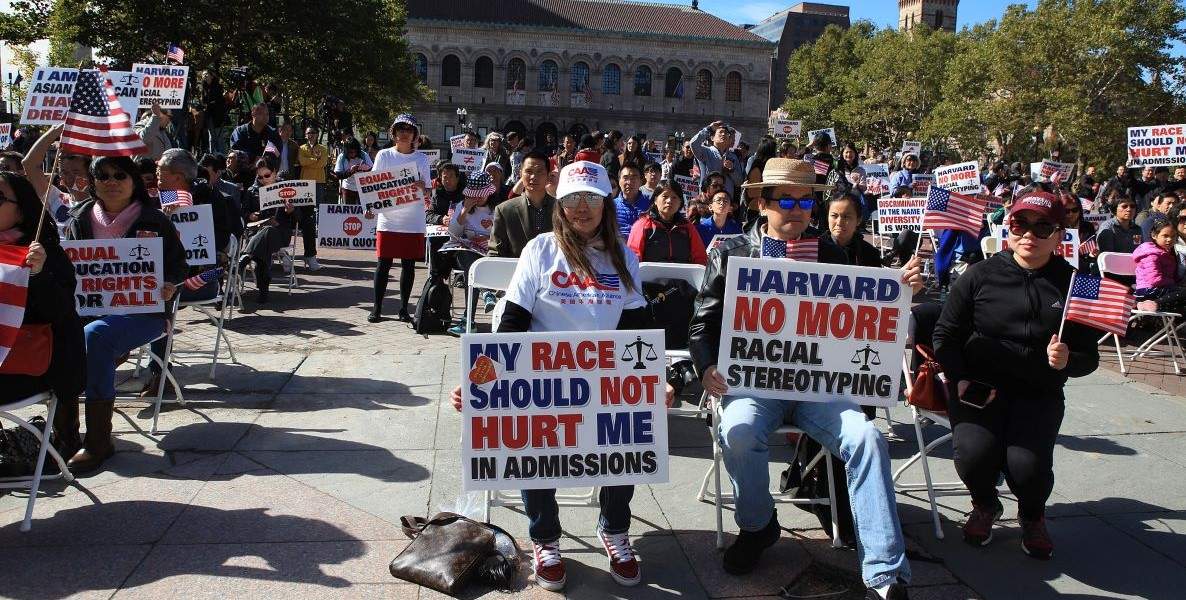The United States Supreme Court recently ruled that factoring race into college admission decisions creates inequality. Legal arguments aside, if considering a college applicant’s race creates inequality, so does factoring an applicant’s legacy status, geographical location, gender, and athletic ability. But no one’s attacking those because this isn’t about creating equality in college admissions. This is about our country’s persistent racial tensions.
What the case was about
Students for Fair Admissions, an affirmative action opposition group, sued Harvard College because, year after year, Harvard admitted the same racial percentages of students, regardless of the makeup of their applicants. This suggests Harvard used race-based admission quotas. Quotas inherently limit the number of applicants from different races, and Asian Harvard applicants were maxing out their quota.
So, Students for Fair Admissions argued Asians were rejected from Harvard not because they were unqualified, but because the quota for Asians had been met already (Harvard has denied this). They also argued that Harvard discriminated against Asians by systematically ranking Asian applicants lower for personality, creating a sort of “soft quota.” If true, that was wrong. Every qualified applicant should be admitted.
Affirmative action isn’t supposed to negatively impact someone’s chances of admission because of their race. But this case wasn’t about righting Harvard’s wrong. This case was the impetus for indicting affirmative action as a whole, and Students for Fair Admissions — headed by Edward Blum, a White man who’s made a career of targeting affirmative action policies — knew that 6 of the 9 Justices have legal philosophies that oppose affirmative action. All the Court needed was an excuse to find it unconstitutional — just give me a reason. And Harvard gave it to them by blatantly discriminating against Asians under the guise of affirmative action.
This Supreme Court case was not about creating an equal college admission process. If that’s what this was, they’d actually have my attention.
This case was the Trojan horse to eliminate programs and policies that have benefited Black and Brown people for generations. This had nothing to do with fairness. If it did, they would’ve targeted admission criteria for legacy status, geographical location, gender, and athletic ability, too.
Non-race-based application boosters
Let’s be real. When we think about affirmative action, we think about race. But race-based affirmative action isn’t the only college admission standard that favors people.
It’s no coincidence that elite institutions — including my school, Swarthmore College — have a nearly 50-50 male-to-female student population. Colleges are prioritizing gender parity in admissions. How can that persist if race can’t be considered? Geography, too. Up in flames go colleges’ international programs — God forbid schools attract students from different places. And the athletes. I know some very mediocre White students who’ve gotten into college because they can throw a ball. Or the legacy students with parents and grandparents who are alumni. Or those wealthy students whose great-grandfather started an endowment for anyone with their last name.
Students for Fair Admissions wants seats at our nation’s most prized institutions reserved for those who master systems set up for cookie-cutter academic and standardized test perfection. But life isn’t cookie-cutter.
None of those admission criteria are based on academic ability. But they are factors nonetheless because colleges admit students according to what they need. Colleges want a competitive sports team, so they admit athletes. They want donations, so they allow alumni to keep the college in the bloodline by having legacy admissions and endowments for students with wealthy alumni’s last names. They aim for gender parity, so colleges admit an equal number of women and men. But we draw the line at colleges wanting racial diversity?
Here, race is the thing being targeted because the Students for Fair Admissions case was not about creating an equal college admission process. If that’s what this was, they’d actually have my attention. This is about certain people claiming what they feel is their rightful place in the pecking order.
Holistic admissions are nothing to fret over
In addition to slamming affirmative action, Students for Fair Admissions decries holistic college admission reviews. For those who don’t know, all holistic reviews do is consider the whole student — their GPA, experiences, extracurriculars, recommendations, academic trends, essays, and passions. This avoids reducing students to their GPA and SAT scores.
An applicant who, for example, spent their high school years getting all As but lacks leadership extracurriculars may not sound like someone you’d want to accept into an elite institution. But if you factor in their essay about having to raise their younger siblings because their parents are ill, the applicant becomes a whole lot more impressive. It shows they have the maturity and discipline to care for their family while maintaining proficient academic performance. I know collegians who’ve lived that story, and they’re exceptional students. But you wouldn’t glean that from their application if you didn’t take their experiences into consideration. And that’s all holistic application reviews are. They allow applicants to be more than a letter grade.
But Students for Fair Admissions doesn’t want that. They want seats at our nation’s most prized institutions reserved for those who master systems set up for cookie-cutter academic and standardized test perfection. But life isn’t cookie-cutter.
You don’t choose to be born into poverty. You don’t choose to be born a minority. You don’t choose to have the deck stacked against you in this country. So, when students from those backgrounds overcome the odds and build the qualifications to be competitive for elite academic institutions, it is a testament to their resiliency, resolve, and determination. Race and class-conscious admissions are not handouts; they’re context. And what can be more fair than adding context, considering the totality of an applicant’s life experiences?
Jemille Q. Duncan is a public policy professional, columnist, and Gates Scholar at Swarthmore College.
![]() MORE RESPONSES TO THE US SUPREME COURT DECISION
MORE RESPONSES TO THE US SUPREME COURT DECISION



